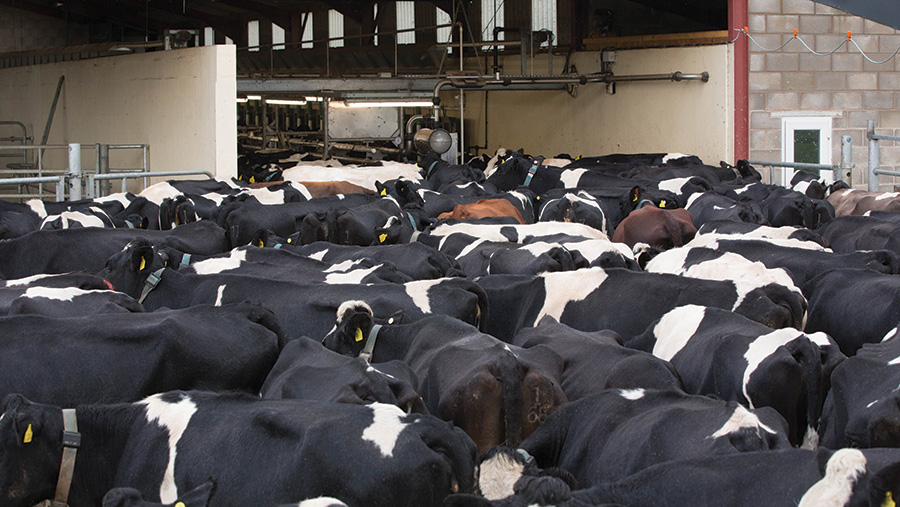‘Severe consequences’ if dairy farming issues aren’t tackled
 © Tim Scrivener
© Tim Scrivener The latest raft of milk price cuts has brought fresh calls for action to improve returns for producers.
The consequences of failure to ensure farmers receive a fair share of the rewards from milk production would be severe, warned NFU Scotland, with the milk price for the vast majority of Scottish producers already significantly below cost of production.
Any action must be urgent, well considered and collaborative, said the union, calling on the dairy supply chain shift from practices which creates short term winners and losers.
See also: 10 ways to lessen pain of low prices for farmers
Well-informed, responsible banks and creditors needed to work with the industry to deliver long-term sustainability, said the union.
Latest milk price and contract changes
 Arla
Arla
- Up to 50 Arla Direct suppliers (non-members) given 12 months’ notice. Their milk price is 16p/litre.
- Price for 2,700 full members held for March, at 21.81p/standard litre.
 Dairy Crest
Dairy Crest
- 400 farmers face 0.8p/litre price drop unless they sign a new contract.
- This will pay them a lower price for milk above a core volume. Those who sign will be paid 22.72p/litre for core milk until 31 May. Those who do not will get a 0.8p/litre cut on 1 April, to 21.92p/standard litre.
 First Milk
First Milk
- Cuts of 0.42-0.6p/litre to “A” milk price for many producers supplying March milk for cheese, to between 17.28p/litre and 17.52p/litre.
 Muller Wiseman
Muller Wiseman
- 1.35p/litre cut to standard litre price from 1 April, taking prices to 19.34p-20p/litre.
- Wyke Farms 1.75p/litre price cut for 110 farmers from April, putting the standard liquid price at 19.3p/litre and taking those on standard manufacturing contracts to 19.96p/litre.
Survival was dependent on working collaboratively with government at all levels to implement a sensible package of market tools, legislation, and trade levers, it said, also criticising the European Commission for reliance on market mechanisms to see post-quota adjustment in milk production.
“The ongoing problems in the dairy sector must not be ignored or put back for another day,” said milk committee chairman, Graeme Kilpatrick, who farms near Kilmarnock.
“At the current level of milk pricing, even the most efficient and resilient producers are worried and NFUS is hugely aware of the psychological and financial impact on farmers.
“We continue to urge dairy producers to take practical steps to seek from their advisers or utilise the resources available through the Scottish Dairy Hub.
“On a more personal note it could be prudent to think about your neighbour and farming friends to ensure no one feels alone in these troubled times.
“The [European] Commission’s belief was that the market mechanisms in place post-quota would be adequate. They are not.
“The recent support package was knee jerk, ill thought out and insignificant in respect of the scale of the crisis.
“Intervention and market support in times of severe market crisis must be reviewed.
“Short term, strategic volume management can help, but must be well considered and effective.
“The commission must also release the potential funding from the European Investment Bank [EIB] to deliver the financial support it was intended to deliver.”
NFU dairy board chairman Rob Harrison called for more milk buyers to show responsibility in trying to match supply and demand, and this needed to be done alongside farmer suppliers, he said.
The latest figures showed daily milk deliveries were coming back in line with February 2015 – UK daily milk deliveries for the two weeks ending February 20 averaged 39.2m litres a day, about (0.3%) lower than the same period last year.
However they remain 3.7% above the three-year average and on a GB basis daily deliveries for the same period were slightly up on last year and 3.9% above the three-year average.
“We desperately need help from the government and the EU who must both do more to ensure a sustainable future for the dairy sector and help make tools available for farmers to manage volatility,” said Mr Harrison.
The NFU is calling for:
- The EIB to speed up its work to refinance farm borrowings
- European institutions to move to alleviate the problems faced by farmers because of the Russian import ban
- A review of dairy intervention price thresholds
- European fertiliser import tariffs to be removed to improve competition in the European fertiliser sector
- The RPA to speed up BPS payments and ensure that this is not a problem in future years.
- Improvements to the labelling of dairy products to ensure consumers are buying British
- Government agencies doing more to support the public procurement of British food
